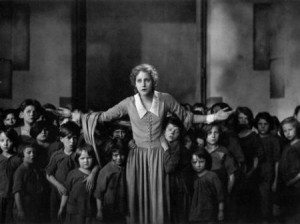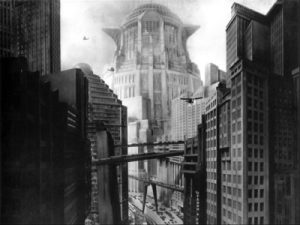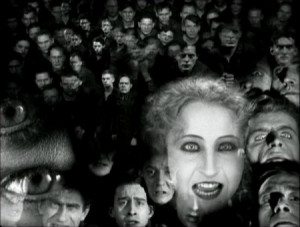A Metropolis of Possibilities
Metropolis with new live score from Dmytro Morykit, Royal Spa Centre, Leamington Spa
15/8/2014
Fritz Lang’s silent film Metropolis (1927) is a dystopian sci-fi that follows the tumultuous story of Freder, the son of Joh Fredersen, the leader of a city divided between the workers, who toil beneath the city, and the bourgeoisie, who live a life of pleasure above ground. Freder becomes sympathetic to the workers’ toiling and falls in love with Maria, a worker who gives sermons to her fellow workers, predicting the coming of a ‘mediator’ that will relieve them of their suffering. Maria embodies love and charity and reiterates the running motif of the film: “The mediator between the head and the hands must be the heart!” The head (Freder’s father) and the hands (the workers) must wait for a mediator, a Christ-like figure, to come and heal the rift between the classes. Disaster strikes when Joh Fredersen discovers that the workers’ desire for freedom is about culminate in revolt and seeks to end their faith in the coming mediator by creating a robot in the image of Maria.
Metropolis is a fascinating movie not least because of the enormous influence it has had on film history (both technically and through its influence on a huge number of sci-fi films) but because it explores the links between classes, Christianity, popular revolt, and how easily the hope for a mediator is invested into false images. The biblical stories the Tower of Babel and the whore of Babylon are recounted throughout to reiterate how, without a unification of the ‘head’ and the ‘hands’, society will divulge into exploitation and decadence. The Tower of Babel was built when all humans could speak the same language and aimed to reach God; God saw this as disobedience and scattered people across the earth, giving them different languages so they could not communicate as a whole people again. In Metropolis the story is recounted again, but focused on the communication between classes, not peoples. The workers, not understanding the language of those who designed the tower, find their work meaningless while the designers fail to grasp the labour that is required to build such a monument and as such a division is created at the core of society. Only the heart will be able to mediate between the two classes, who speak a different languages, and lead to a cohesive society again.
Today we still see an enormous gap between those with power and those without, and film itself can provide, in a way that Metropolis points to, a change in voices so that those who are drowned out by the loudest and yet most stultifying filmic representations may speak in such a way as to be heard.

Maria embodies love and charity and reiterates the running motif of the film: “The mediator between the head and the hands must be the heart!”
Filmed during the inter-war years of the Weimar republic in Germany, a time of artistic and political experimentation that ended with the rise of fascism, one can easily see the imperative that Lang places on politics in this work. The question of how to organise society and what role the arts would play in this communicative field was of vital importance, one that has continued through the French New Wave to, I would argue, Lars von Trier, Joshua Oppenheimer and Steve McQueen in various ways. The answer for Maria was that heart was needed, an injection of love. But does this instead situate the film itself as the mediator to a political-economic rift? Today we still see an enormous gap between those with power and those without, and film itself can provide, in a way that Metropolis points to, a change in voices so that those who are drowned out by the loudest and yet most stultifying filmic representations may speak in such a way as to be heard. Communication would not be the reunification of all peoples in a universal language, whether linguistic or filmic, but part of a process of constant change. I feel on this premise we should reject the happy ending of Metropolis as a comforting reminder of our englightened, post-class age and instead watch it with a view to what can be done by changing it, both as a viewer and as a potential creator.
Luckily, being a silent film, Metropolis is gifted with a multitude of soundtracks that have been created for it over 87 years since its release that extend its possibilities in interesting directions. The original score involves aspects of Wagnerian drama with modernist touches, sometimes seeming overly dramatic compared to the somewhat cheesy plot-points and slap-stick acting. Club Foot Orchestra’s 1991 musical score has a sometimes dark and often tumultuous jazz feel to it, combined with elements of modernist a-tonal music, junkyard percussion and folk, completely in opposition to Giorgio Moroder’s 1984 pop-album soundtrack.
Dmytro Morykit’s solo piano score, performed at the Royal Spa Centre in Leamington, is the result of a subtle lifelong influence by the film, only recently being made into the score he is currently touring with. At many points it works to add intensity and heightens the suspense of actions scenes that would otherwise appear dated, pulling in the audience into a new way of experiences a classic. Morykit’s work falters at moments when it seems to push Metropolis into slap-stick, a real risk when viewing classics with our modern eyes. But nonetheless these attempts are necessary to invigorate old works and the role of sound should be exposed in this manner to allow new life to grow out of films now considered simply ‘classics’ and sadly calcified in monolithic interpretations.



Comments